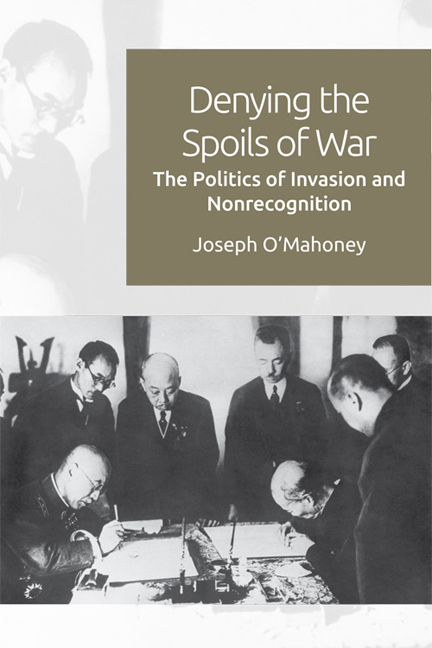Book contents
- Frontmatter
- Contents
- List of Figures and Tables
- Acknowledgements
- List of Acronyms and Abbreviations
- Introduction
- 1 Rule Maintenance: the Logic of Symbolic Sanctions
- 2 The Manchurian Crisis
- 3 The Abyssinian Crisis
- 4 Turkey, Cyprus and the Turkish Republic of Northern Cyprus
- 5 The Independence of Bangladesh
- 6 The Uncertain Fruits of Victory: Variation in Nonrecognition
- Conclusion
- Bibliography
- Index
Introduction
- Frontmatter
- Contents
- List of Figures and Tables
- Acknowledgements
- List of Acronyms and Abbreviations
- Introduction
- 1 Rule Maintenance: the Logic of Symbolic Sanctions
- 2 The Manchurian Crisis
- 3 The Abyssinian Crisis
- 4 Turkey, Cyprus and the Turkish Republic of Northern Cyprus
- 5 The Independence of Bangladesh
- 6 The Uncertain Fruits of Victory: Variation in Nonrecognition
- Conclusion
- Bibliography
- Index
Summary
Law is not necessarily disintegrated by impotence; but it is destroyed by unqualified submission to the lawlessness of force. (Lauterpacht 1947: 435)
The island of Cyprus in the Eastern Mediterranean Sea is home to two groups. One defines itself as ethnically Greek, the other as ethnically Turkish. Each group has a territory and an administration that claims to represent a state as a member of the international community. However, despite this situation having existed for almost forty years, the international community does not acknowledge the claim of the Turkish-Cypriots as legitimate. No state or international organisation in the world, except for Turkey, recognises the Turkish Republic of Northern Cyprus (TRNC) as a state, despite its decades-long de facto existence. One of the most interesting features of this legal limbo is the nominal basis for the international community's rejection of the Turkish-Cypriot claim; their state is illegitimate because it is the result of aggression.
It seems natural in today's world that victory in a war of aggression does not mean that the victor should be able to do as it pleases with the property, territory, population and political institutions of the defeated state. However, in the nineteenth century, exploiting your victory in war to impose terms on your victim was seen as the normal and legitimate thing to do. One example of many is the outcome of the Franco-Prussian War fought from 1870 to 1871. At the end of that war, the victorious German Empire demanded, among other concessions, most of Alsace-Lorraine and five billion francs from France. Other powers treated these concessions as a normal and acceptable part of war-making and respected Germany's new borders. When other states did contest concessions wrung from a victim, it was not on the basis that these were a crime against peace. Often the proposed alternative was to divide the spoils among themselves. Russia, Germany and France opposed China's cession of the Liaodong peninsula to Japan in the 1895 Treaty of Shimonoseki. After Japan agreed to take a large financial indemnity in place of the territory, the other colonial powers occupied the peninsula, seizing the valuable port cities for themselves (Mutsu 1982).
- Type
- Chapter
- Information
- Denying the Spoils of WarThe Politics of Invasion and Nonrecognition, pp. 1 - 14Publisher: Edinburgh University PressPrint publication year: 2018

